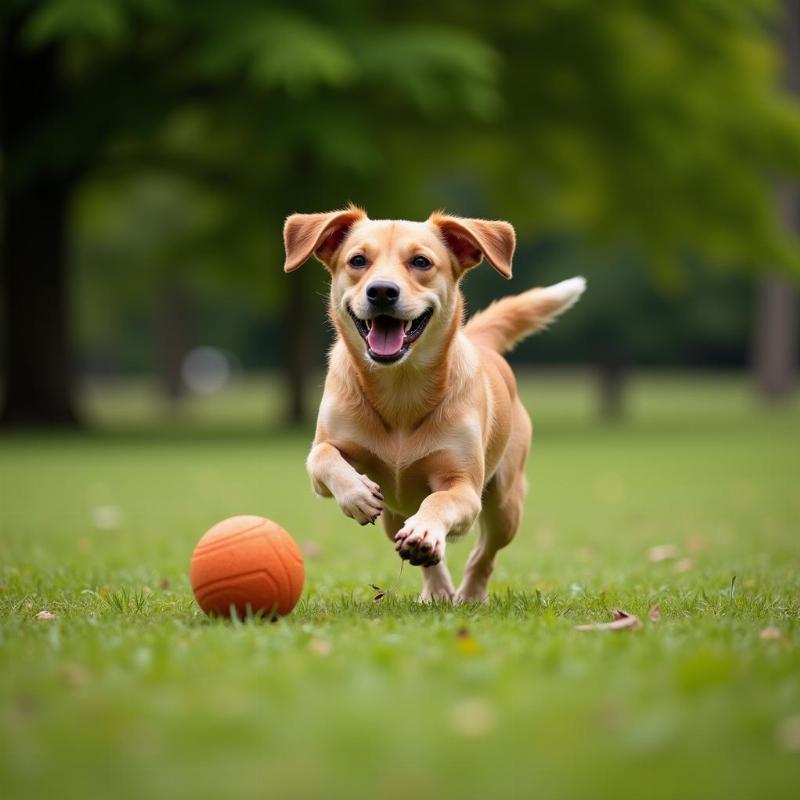If you’ve caught your dog excessively licking their behind, you’re not alone. This common behavior, while sometimes amusing, can often signal underlying issues. Understanding why your dog licks his butt is crucial for addressing potential problems and ensuring your furry friend’s well-being. This article will delve into the various reasons behind this behavior, from simple hygiene to more complex medical concerns, and offer practical solutions for concerned pet owners in the US.
Common Reasons for Butt Licking in Dogs
Several factors can contribute to a dog’s tendency to lick their rear. Identifying the root cause is the first step toward resolving the issue.
Hygiene and Grooming
Sometimes, the simplest explanation is the right one. Dogs may lick themselves back there as a form of self-grooming, especially after defecating. A small amount of fecal matter clinging to the fur can irritate the skin, prompting licking.
Anal Gland Issues
Anal glands, located on either side of the anus, release a foul-smelling fluid during bowel movements. If these glands become impacted or infected, they can cause discomfort and itching, leading to increased licking. Symptoms of anal gland problems can include scooting (dragging the rear across the floor) and a strong, fishy odor.
Allergies and Skin Irritations
Allergies, whether food-related or environmental, can cause skin inflammation and itching, including around the anal area. Fleas, mites, and other parasites can also irritate the skin, prompting your dog to lick excessively.
Infections
Bacterial or yeast infections can affect the skin around the anus, causing discomfort and itching. These infections may appear as redness, swelling, or discharge.
Parasites
Intestinal parasites, such as worms, can irritate the anus, leading to increased licking. While some worms are visible in the stool, others require a fecal examination by a veterinarian to diagnose.
When to Worry: Recognizing Serious Concerns
While occasional butt licking is normal, excessive or persistent licking can indicate a more serious problem. Consult your veterinarian if you notice any of the following:
- Constant licking: If your dog is obsessively licking their butt, it’s time to seek professional advice.
- Scooting: This behavior, where the dog drags their rear across the floor, is a strong indicator of anal gland issues.
- Redness, swelling, or discharge: These signs suggest a potential infection or skin irritation.
- Changes in stool: Diarrhea, constipation, or blood in the stool can indicate digestive problems.
- Vocalization or signs of pain: Whining, yelping, or other signs of discomfort warrant immediate veterinary attention.
Preventing and Treating Butt Licking
Addressing the underlying cause is crucial for stopping excessive butt licking. Here are some steps you can take:
- Regular Grooming: Keeping the anal area clean can prevent irritation and minimize licking.
- Anal Gland Expression: Your veterinarian or a professional groomer can express your dog’s anal glands if they are impacted.
- Dietary Changes: If allergies are suspected, your vet may recommend a hypoallergenic diet.
- Parasite Prevention: Regular flea and tick prevention and deworming can help protect your dog from parasites.
- Medications: Your veterinarian may prescribe antibiotics or antifungals for infections or other medications to address allergies or skin irritations.
Talking to Your Vet
When discussing your dog’s butt licking with your veterinarian, be prepared to provide details about the frequency and duration of the behavior, any other symptoms you’ve noticed, and your dog’s diet and medical history. This information will help your vet determine the underlying cause and recommend the appropriate treatment.
 Chó khỏe mạnh hạnh phúc
Chó khỏe mạnh hạnh phúc
Conclusion
While seeing your dog lick their butt might be a common occurrence, it’s essential to pay attention to the frequency and accompanying symptoms. By understanding the potential causes and seeking veterinary care when necessary, you can ensure your furry companion’s comfort and well-being. Remember, addressing the root cause is key to resolving this issue and preventing future problems.
FAQ
- Is it normal for dogs to lick their butts? Occasional licking is normal, but excessive licking can indicate a problem.
- How can I tell if my dog has impacted anal glands? Scooting and a strong, fishy odor are common signs.
- What should I do if my dog is constantly licking their butt? Consult your veterinarian for a proper diagnosis and treatment plan.
- Can allergies cause butt licking in dogs? Yes, allergies can cause skin irritation and itching, leading to licking.
- How can I prevent my dog from licking their butt? Regular grooming, parasite prevention, and addressing any underlying medical conditions can help.
- What are the treatment options for excessive butt licking? Treatment depends on the underlying cause and may include anal gland expression, dietary changes, medications, or parasite control.
- When should I be concerned about my dog licking their butt? Consult your vet if the licking is excessive, accompanied by other symptoms, or if your dog seems distressed.
Related Articles
- she wasn’t lying dog
- why does my dog constantly lick the floor
- why do dogs lay down when they see other dogs
- male dog obsessed with toy
- why is my dog biting his butt
Beautdogs.us is your premier destination for all things dog-related in the US. We provide expert advice on dog breeds, care, and product recommendations. Whether you’re a seasoned dog owner or just starting your journey with a furry friend, Beautdogs.us offers comprehensive and trustworthy information to enhance your dog’s life. Contact us today for all your dog-related needs! Email: [email protected], Phone: +1 501-555-7529.